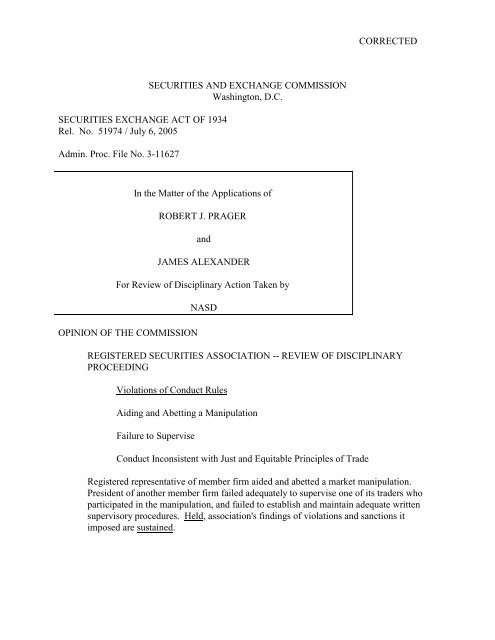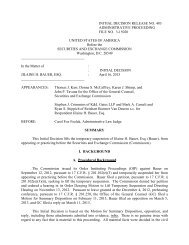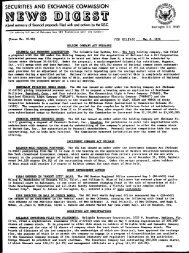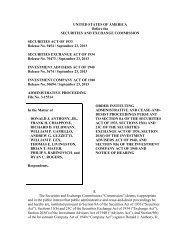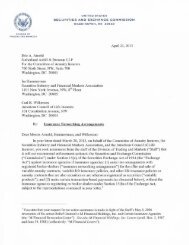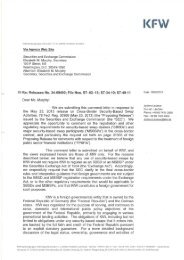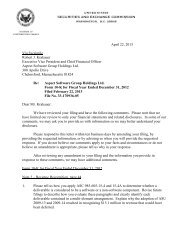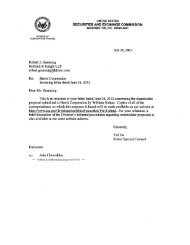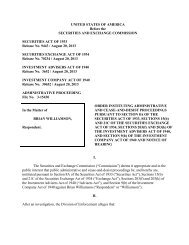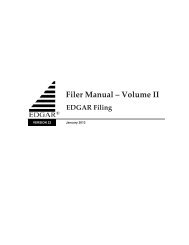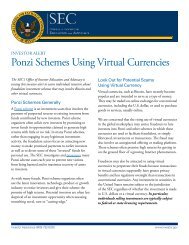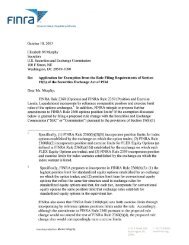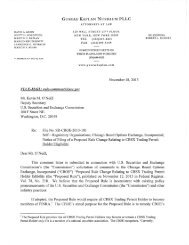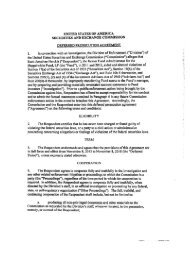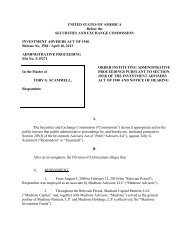Commission Opinion: ROBERT J. PRAGER and JAMES ALEXANDER
Commission Opinion: ROBERT J. PRAGER and JAMES ALEXANDER
Commission Opinion: ROBERT J. PRAGER and JAMES ALEXANDER
Create successful ePaper yourself
Turn your PDF publications into a flip-book with our unique Google optimized e-Paper software.
SECURITIES EXCHANGE ACT OF 1934<br />
Rel. No. 51974 / July 6, 2005<br />
Admin. Proc. File No. 3-11627<br />
SECURITIES AND EXCHANGE COMMISSION<br />
Washington, D.C.<br />
In the Matter of the Applications of<br />
<strong>ROBERT</strong> J. <strong>PRAGER</strong><br />
<strong>and</strong><br />
<strong>JAMES</strong> <strong>ALEXANDER</strong><br />
For Review of Disciplinary Action Taken by<br />
OPINION OF THE COMMISSION<br />
NASD<br />
REGISTERED SECURITIES ASSOCIATION -- REVIEW OF DISCIPLINARY<br />
PROCEEDING<br />
Violations of Conduct Rules<br />
Aiding <strong>and</strong> Abetting a Manipulation<br />
Failure to Supervise<br />
Conduct Inconsistent with Just <strong>and</strong> Equitable Principles of Trade<br />
CORRECTED<br />
Registered representative of member firm aided <strong>and</strong> abetted a market manipulation.<br />
President of another member firm failed adequately to supervise one of its traders who<br />
participated in the manipulation, <strong>and</strong> failed to establish <strong>and</strong> maintain adequate written<br />
supervisory procedures. Held, association's findings of violations <strong>and</strong> sanctions it<br />
imposed are sustained.
APPEARANCES:<br />
Anthony W. Djinis, Paul J. Bazil, <strong>and</strong> Peter E. McLeod, of Pickard <strong>and</strong> Djinis LLP, for<br />
Robert J. Prager.<br />
Richard N. Friedman, for James Alex<strong>and</strong>er.<br />
2<br />
Marc Menchel, Alan B. Lawhead, Carla Carloni, <strong>and</strong> Vickie R. Olafson, for NASD.<br />
Appeal filed: September 15, 2004<br />
Last brief filed: December 21, 2004<br />
1/ NASD Conduct Rule 2110 requires members to adhere to "high st<strong>and</strong>ards of commercial<br />
honor <strong>and</strong> just <strong>and</strong> equitable principles of trade."<br />
2/ NASD Conduct Rule 3010 requires members to "establish <strong>and</strong> maintain a system to<br />
supervise the activities of each registered representative <strong>and</strong> associated person that is<br />
reasonably designed to achieve compliance" with applicable securities laws, regulations,<br />
<strong>and</strong> NASD rules.<br />
3/ The <strong>Commission</strong> has determined that a violation of another NASD rule, in this case<br />
Conduct Rule 3010, constitutes a violation of Conduct Rule 2110. See Stephen J.<br />
Gluckman, 54 S.E.C. 175, 185 & n.31 (1999).<br />
I.<br />
Robert J. Prager, a trader with Saperston Financial, Inc., a former NASD member firm,<br />
<strong>and</strong> James Alex<strong>and</strong>er, president, owner, <strong>and</strong> chief compliance officer of J. Alex<strong>and</strong>er Securities,<br />
Inc., a registered broker-dealer <strong>and</strong> NASD member firm, appeal from NASD disciplinary action.<br />
NASD found that Prager aided <strong>and</strong> abetted a manipulative scheme to raise artificially the volume<br />
<strong>and</strong> price of H&R Enterprises, Inc. ("H&R") common stock, in violation of NASD Conduct Rule<br />
2110. 1/ In addition, NASD found that Alex<strong>and</strong>er violated NASD Conduct Rules 3010 2/ <strong>and</strong><br />
2110 3/ in connection with his supervision of Jerome E. Rosen, an Alex<strong>and</strong>er Securities trader<br />
who participated in the H&R stock manipulation. 4/ NASD barred Prager from association with<br />
4/ Alex<strong>and</strong>er Securities also was found liable as part of this proceeding, <strong>and</strong> gave notice of<br />
its appeal. It thereafter notified us that it had filed a voluntary petition in bankruptcy.<br />
Under 11 U.S.C. § 362, that bankruptcy filing triggered an automatic stay of the<br />
proceeding as to Alex<strong>and</strong>er Securities. Robert J. Prager, Securities Exchange Act Rel.<br />
No. 50595 (Oct. 26, 2004), 83 SEC Docket 3935; see Steven P. S<strong>and</strong>ers, 53 S.E.C. 889,<br />
890 n.1 (1998); Franklin N. Wolf, 52 S.E.C. 517, 518 n.1 (1995). As a result, our<br />
findings that pertain to Alex<strong>and</strong>er Securities are made solely for purposes of this<br />
(continued...)
any member in any capacity. 5/ Alex<strong>and</strong>er was fined $200,000, suspended for two years, <strong>and</strong><br />
required to requalify as a principal. We base our findings on an independent review of the<br />
record.<br />
A. Overview of the H&R Manipulation<br />
4/ (...continued)<br />
proceeding <strong>and</strong> are not binding on the firm.<br />
5/ NASD ordered Prager to pay $8,521 in hearing costs, jointly <strong>and</strong> severally with<br />
Alex<strong>and</strong>er <strong>and</strong> Alex<strong>and</strong>er Securities.<br />
3<br />
II.<br />
The H&R manipulation was orchestrated by Michael L. Mitton, a Canadian resident, in<br />
conjunction with David S. Heredia, a Florida stock promoter who was president of an investor<br />
relations firm. 6/ At all relevant times, H&R was a shell company with no business operations,<br />
which purported to have interests in vending <strong>and</strong> leasing industries. H&R's stock traded through<br />
the over-the-counter bulletin board.<br />
Mitton acquired control of H&R in January 1997. Over the next several months, Mitton<br />
caused H&R to issue nearly three million shares of stock to his nominees <strong>and</strong> associates at $.05<br />
or less per share. Those shares were placed in accounts held by Mitton's nominees <strong>and</strong> associates<br />
at certain Canadian brokerage firms. Mitton also caused H&R to hire Heredia's firm to promote<br />
H&R stock to securities market participants <strong>and</strong> the public. Heredia's firm received a substantial<br />
number of H&R shares as compensation for its services.<br />
Mitton <strong>and</strong> Heredia devised a complex scheme whereby they would direct traders at<br />
United States brokerage firms to create artificial trading activity in the public market for H&R<br />
stock. The trading activity was designed to make H&R appear attractive to potential investors,<br />
to increase the trading price of H&R stock, <strong>and</strong> to position themselves to take advantage of the<br />
6/ Mitton <strong>and</strong> Heredia were not respondents in this proceeding. Mitton was barred by the<br />
British Columbia Securities <strong>Commission</strong> in 1988 from trading securities or serving as a<br />
director or officer of any securities issuer in British Columbia for twenty years, after he<br />
admitted that he engaged in stock manipulation <strong>and</strong> insider trading. Heredia, who was<br />
last registered with an NASD member in January 1996, was barred in all capacities by<br />
NASD in 1998 as a result of charges that he engaged in fraudulent sales practices <strong>and</strong><br />
unauthorized transactions while a registered representative at Stratton Oakmont, Inc. In<br />
2000, after a district court entered a permanent injunction against him, the <strong>Commission</strong><br />
barred Heredia from associating with any broker or dealer <strong>and</strong> participating in any penny<br />
stock offering. See David Scott Heredia, Exchange Act Rel. No. 42513 (Mar. 9, 2000),<br />
71 SEC Docket 2463.
4<br />
planned increase in the stock's price by selling their shares at the artificially inflated prices. As<br />
part of this scheme, Heredia recruited three traders at three different NASD member firms --<br />
Prager at Saperston, Timothy E. Chamberlain at Equitrade Securities Corporation, 7/ <strong>and</strong> Rosen<br />
at Alex<strong>and</strong>er Securities 8/ -- to trade H&R stock, as directed, in exchange for guaranteed profits.<br />
With Prager's, Chamberlain's, <strong>and</strong> Rosen's participation, H&R stock traded in a circular fashion,<br />
at continually increasing prices, among the firms of the three traders, NASD member firm Hill<br />
Thompson Magid, L.P., <strong>and</strong> the accounts of Mitton's nominees <strong>and</strong> associates at the Canadian<br />
brokerage firms. This trading arrangement allowed Mitton <strong>and</strong> Heredia to manipulate the price<br />
of H&R from $2.21 to $6.68 per share between September 22 <strong>and</strong> 25, 1997. Once the price had<br />
been manipulated to the higher levels, Mitton's nominees <strong>and</strong> associates, including Heredia, sold<br />
the large blocks of H&R stock that they had obtained at little or no cost <strong>and</strong> reaped millions of<br />
dollars in profits. 9/<br />
On September 24, 1997, certain of Mitton's nominees <strong>and</strong> associates refused to accept<br />
large purchases of H&R stock which they had made from Saperston <strong>and</strong> Alex<strong>and</strong>er Securities.<br />
Two days later, the price of H&R dropped below $2.00 per share, leaving Saperston <strong>and</strong><br />
Alex<strong>and</strong>er Securities with approximately 1.7 million <strong>and</strong> 600,000 shares, respectively, that they<br />
had bought at higher prices. 10/ Saperston incurred a multi-million dollar loss that it was unable<br />
to sustain, <strong>and</strong> was forced to cease operating because of insufficient net capital. Alex<strong>and</strong>er<br />
Securities was able to sustain its loss, which exceeded $1 million, <strong>and</strong> continue operating.<br />
7/ Chamberlain was named as a respondent in this proceeding, but entered into a settlement<br />
with NASD's Department of Enforcement under which he was barred from association<br />
with any NASD member in any capacity. Department of Enforcement v. J. Alex<strong>and</strong>er<br />
Securities, Inc., Discip. Proc. No. CAF010021 (Sept. 26, 200) (Order Accepting Offer of<br />
Settlement).<br />
8/ Rosen was also named as a respondent, but the proceeding was stayed as to him as a<br />
result of his filing a bankruptcy petition. An NASD Hearing Officer subsequently<br />
granted a motion by Enforcement to withdraw the complaint against Rosen, without<br />
prejudice, based on his consent to a <strong>Commission</strong> administrative order barring him from<br />
the securities industry for manipulative trading in Systems of Excellence, Inc. stock.<br />
Jerome E. Rosen, Exchange Act Rel. No. 47908 (May 22, 2003), 80 SEC Docket 975.<br />
9/ Through their manipulation of H&R stock, Mitton <strong>and</strong> Heredia generated gross profits of<br />
approximately $6,095,185 <strong>and</strong> $842,974, respectively. Equitrade earned approximately<br />
$1.1 million trading in H&R stock at Mitton's <strong>and</strong> Heredia's direction.<br />
10/ Had the trades not been disavowed, Saperston <strong>and</strong> Alex<strong>and</strong>er Securities would have<br />
profited by approximately $358,491 <strong>and</strong> $481,359, respectively, based on H&R's<br />
September 25, 1997 stock price.
B. Prager's Involvement in the H&R Manipulation<br />
1. Prager Opens a Saperston Branch Office<br />
5<br />
Prager entered the securities industry in 1987 as a general securities representative <strong>and</strong><br />
became a general securities principal in 1993. That same year, Prager joined Emanuel & Co.,<br />
where he assisted trader Richard L. Newberg. Prager also became acquainted with Rosen, who<br />
was then associated with Emanuel. In 1995, Newberg <strong>and</strong> Rosen moved to the Florida branch<br />
office of Alex<strong>and</strong>er Securities, which was an office of supervisory jurisdiction. 11/ In September<br />
1996, Prager went to work in Alex<strong>and</strong>er Securities' Florida office.<br />
In May 1997, Prager left Alex<strong>and</strong>er Securities <strong>and</strong> opened a Florida branch of Saperston,<br />
a Buffalo, New York-based firm. Prager hired a former trading assistant of Rosen's at Alex<strong>and</strong>er<br />
Securities to assist him. Prager's business at Saperston consisted of wholesale trading with other<br />
broker-dealers. Prager made a market in about twenty-five to sixty securities. Eighty percent of<br />
the securities Prager traded were bulletin board stocks, with the remainder consisting of Nasdaqtraded<br />
securities.<br />
2. Prager Agrees to Make a Market in H&R Stock at Heredia's Request<br />
Prager testified that he first learned about H&R in July 1997 when his assistant arranged<br />
for him to discuss the stock with Heredia by telephone. Prior to this time, Prager had never heard<br />
of either Heredia or his firm. Heredia told Prager that he "represented" numerous, unspecified<br />
institutional accounts <strong>and</strong> was interested in buying H&R stock for these accounts. Apparently<br />
based solely on their telephone conversations, Prager considered Heredia to be a "player" (in his<br />
words, someone who "does a lot of business") <strong>and</strong> agreed to make a market in H&R stock.<br />
Prager entered into an oral agreement with Heredia to purchase <strong>and</strong> sell H&R shares at Heredia's<br />
direction <strong>and</strong> to be paid a guaranteed profit of $.03 per share.<br />
Prager acknowledged that he did not perform any background check on Heredia or ask<br />
Heredia for a "letter of authority" regarding the institutions that Heredia purported to represent.<br />
Prager testified that, in his business at Saperston, he got "order flow," i.e., buy <strong>and</strong> sell orders,<br />
<strong>and</strong> "didn't check out people in that sense." Prager also acknowledged that he did not attempt to<br />
learn anything about H&R before agreeing to trade in its stock. Instead, Prager testified, several<br />
weeks later he obtained a "st<strong>and</strong>ard packet" about the company -- from what source, he did not<br />
know or care -- containing "some numbers, some projections, what [H&R] did." Prager claimed<br />
at the hearing to have "skimmed through" the packet's contents, but he admitted that it had no<br />
impact on his decision to trade H&R stock on Heredia's behalf. Prager's sole consideration, he<br />
conceded, was potential "order flow" from Heredia <strong>and</strong> the profits resulting from those orders.<br />
11/ See NASD Conduct Rule 3010(g) (defining the term "office of supervisory jurisdiction").<br />
Alex<strong>and</strong>er Securities was headquartered in Los Angeles, California.
3. Prager's Early Trading in H&R Stock<br />
6<br />
Under Prager's trading arrangement with Heredia, Heredia did not open a trading account<br />
at Saperston or pay for any of the trades that Prager executed on Heredia's behalf. Rather, Prager<br />
traded H&R stock through Saperston's proprietary account. Prager testified that he began trading<br />
H&R stock at Heredia's request on August 6, 1997. Prager stated that his H&R stock trading for<br />
Heredia followed a pattern. Heredia would call in a market or a limit order for Prager to buy a<br />
certain number of shares of H&R stock. 12/ Prager would buy the designated number of shares<br />
<strong>and</strong>, as directed by Heredia, report the number of shares that he had acquired <strong>and</strong> his average cost<br />
per share to Heredia. Heredia then would instruct Prager to sell those shares to Chamberlain at<br />
Equitrade, the firm at which Heredia told Prager that he had institutional accounts that he<br />
represented. Prager testified that he would sell the shares of H&R stock to Chamberlain at the<br />
price designated by Heredia, which was the price that Prager had paid for them plus Prager's<br />
profit of $.03 per share, without regard to the price Equitrade was quoting for the stock. Prager<br />
testified that, when he first started trading the stock at Heredia's direction, he would contact<br />
Chamberlain before accumulating any shares to make sure that Equitrade would buy the shares<br />
necessary to flatten out Prager's position in the stock. Prager testified that eventually he stopped<br />
contacting Chamberlain because he was confident Equitrade would buy the accumulated shares.<br />
In each instance when Prager or his assistant contacted Chamberlain to confirm Equitrade's<br />
purchase of H&R stock, Chamberlain already knew the quantity of shares that he was to buy <strong>and</strong><br />
the average price that Prager had paid for them, trade details that Prager or his assistant had<br />
discussed with Heredia prior to speaking to Chamberlain. As a result of this trading<br />
arrangement, Prager was able to maintain a flat position in H&R stock so that his purchases of<br />
the stock equaled his sales.<br />
From August 6 through September 19, 1997, Prager's trades of H&R stock on Heredia's<br />
behalf ranged in size from 500 shares to 25,000 shares. During this period, Heredia directed<br />
Prager to trade increasingly greater quantities of H&R stock. Because Prager's trading in H&R<br />
stock soon became a major part of Saperston's business, Prager decided that he should meet<br />
Heredia in person. The two met over dinner on Friday, September 19, 1997, at which time<br />
Heredia praised Prager for doing a good job buying <strong>and</strong> selling H&R stock for him. Heredia also<br />
told Prager that he represented a $50 million institutional account at Wolverton Securities, Ltd., a<br />
Canadian firm, <strong>and</strong> that he would be directing Prager to make large purchases of H&R stock for<br />
this account in the coming week. Prager testified that he made no effort to corroborate Heredia's<br />
claim that he represented an institutional account at Wolverton or confirm the amount of money<br />
that was in the account. Prager stated unequivocally that he "wouldn't question [Heredia] about<br />
the [Wolverton] account." Prager explained that he had "been dealing with Heredia for hundreds<br />
of trades," <strong>and</strong> that "there [had not] been a problem on any other trade[s]." As far as Prager was<br />
12/ A market order is an order to buy or sell a security at the best available price. Barron's<br />
Dictionary of Finance <strong>and</strong> Investment Terms 350 (5th ed. 1998). A limit order is an order<br />
to buy or sell a security at a specific price or better. Id. 328.
concerned, it made no difference whether he was selling to Equitrade or Wolverton because, in<br />
either case, he was "representing orders" <strong>and</strong> "doing good business."<br />
7<br />
4. Price <strong>and</strong> Volume Increases in H&R Stock from September 22 to September 24, 1997<br />
On Monday, September 22, 1997, the first business day following Prager's meeting with<br />
Heredia, the volume of shares that Prager purchased on Heredia's behalf increased to 176,000<br />
shares. Heredia's instructions to Prager on that day were to "take the offer," i.e., to pay the inside<br />
offer price, to fill Heredia's purchase orders. As a result, Prager filled most of Heredia's purchase<br />
orders for H&R stock from Hill Thompson, the only market maker consistently at the inside<br />
offer. 13/ Each time Prager bought H&R stock from Hill Thompson at the inside offer, Hill<br />
Thompson would uptick the inside offer for the stock slightly. 14/ Prager would then uptick<br />
Saperston's inside bid. The opening <strong>and</strong> closing price of H&R on September 22, 1997, was<br />
$2.21 <strong>and</strong> $2.68 per share, respectively. The increase in H&R's price was due mostly to<br />
Saperston's upticks <strong>and</strong> those of Alex<strong>and</strong>er Securities, which was also making a market in the<br />
stock.<br />
On Tuesday, September 23, 1997, at Heredia's direction, Prager bought more than one<br />
million shares of H&R stock from various broker-dealers, including 594,000 shares from Hill<br />
Thompson. Prager repeatedly upticked the inside bid to fill Heredia's purchase orders. The price<br />
of H&R rose from $2.71 to $3.53 per share on September 23, 1997, based on Saperston's <strong>and</strong><br />
Alex<strong>and</strong>er Securities' trading activities. Prager sold 1,090,000 shares of H&R stock to Equitrade<br />
on that date in accordance with his trading arrangement with Heredia.<br />
Also on September 23, 1997, two Canadian firms that previously had purchased H&R<br />
stock from Equitrade "DK'd," or refused to acknowledge, those trades. 15/ After Chamberlain<br />
complained to Heredia about the DK'd trades, Chamberlain began receiving purchase orders for<br />
H&R stock from Wolverton. That same day, Equitrade management instructed Chamberlain not<br />
to purchase any more H&R stock, citing the problem with the DK'd trades. However,<br />
Chamberlain continued trading the stock for at least another day.<br />
13/ The inside offer <strong>and</strong> bid prices, respectively, are the lowest offer <strong>and</strong> the highest bid. See,<br />
e.g., 17 C.F.R. § 240.15g-3.<br />
14/ An uptick occurs when a securities transaction is executed at a price higher than the<br />
previous transaction in the same security. Richard D. Chema, 53 S.E.C. 1049, 1051 n.5<br />
(1998).<br />
15/ The term "DK" or "don't know" is used when brokers question a trade <strong>and</strong> exchange<br />
comparison sheets to verify the details of the transaction. See Barron's Dictionary of<br />
Finance <strong>and</strong> Investment Terms 160 (5th ed. 1998).
8<br />
On Wednesday, September 24, 1997, Heredia directed Prager to purchase more than five<br />
million shares of H&R stock. Prager continued repeatedly to uptick the inside bid for the stock<br />
pursuant to Heredia's instructions to acquire the stock. The price of H&R increased dramatically<br />
on that day. The stock opened at $3.56 <strong>and</strong> closed at $6.09. As before, Saperston <strong>and</strong> Alex<strong>and</strong>er<br />
Securities were responsible for the majority of upticks to the inside bid price of H&R stock.<br />
Prager conceded that the rise in H&R's price on September 24, 1997, was a result of Saperston's<br />
<strong>and</strong> Alex<strong>and</strong>er Securities' trading, <strong>and</strong> had nothing to do with any positive news event concerning<br />
the company.<br />
By noon on September 24, 1997, Prager had accumulated more than 1.4 million shares of<br />
H&R stock. At this point, Prager started to fall behind in selling H&R stock due to the size <strong>and</strong><br />
number of transactions involved <strong>and</strong> the time it took to compute his average cost <strong>and</strong> report back<br />
to Heredia. Nonetheless, Prager was able to sell 1.2 million shares to Chamberlain at Equitrade<br />
shortly after noon that day.<br />
Later in the afternoon on September 24, 1997, Heredia called Prager <strong>and</strong>, without telling<br />
Prager about the Equitrade transactions that had been DK'd, advised that he was going to begin<br />
holding H&R stock at Wolverton, the Canadian brokerage firm, instead of Equitrade. To ensure<br />
Prager's continued acquiescence in the trading scheme, Heredia told Prager that he would start<br />
paying Prager $.06 per share on H&R trades instead of the $.03 he had been paying. Heredia<br />
then instructed Prager to buy back from Equitrade 800,000 of the 1.2 million shares that he had<br />
sold to Equitrade earlier that day, <strong>and</strong> to sell those shares to Wolverton. As Heredia directed,<br />
Prager bought back the 800,000 shares <strong>and</strong> continued to purchase large amounts of H&R stock,<br />
primarily from Hill Thompson, which Prager, in turn, sold to Wolverton.<br />
Towards the end of the trading day on September 24, 1997, Prager informed Heredia that<br />
he still needed to buy 70,000 shares of H&R stock to complete Heredia's order to sell two million<br />
shares to Wolverton. Heredia told Prager to purchase the 70,000 shares from Rosen at Alex<strong>and</strong>er<br />
Securities. As Heredia directed, Prager bought the final 70,000 shares from Rosen, <strong>and</strong> then sold<br />
the accumulated two million shares to Wolverton.<br />
The trading that occurred between September 22 <strong>and</strong> 24, 1997, caused the inside bid price<br />
for H&R stock to soar from $2.21 to $6.09 per share, an increase of almost 175 percent. During<br />
that three-day period, Prager was responsible for over fifty percent of the upticks to the inside bid<br />
price, while Rosen, who appeared to be the most active competitor against Prager for H&R stock,<br />
was responsible for over forty percent of the upticks. When Prager stopped upticking the inside<br />
bid price of H&R after September 24, 1997, Rosen continued to do so, increasing the stock's<br />
price from $6.12 to $6.68 per share on September 25, 1997.<br />
5. The End of the H&R Manipulation<br />
On Thursday morning, September 25, 1997, Saperston's back office in Buffalo informed<br />
Prager that the prior day's trades with Equitrade <strong>and</strong> Wolverton were not "comparing," i.e., the
16/ Prager stipulated that the loss Saperston incurred was approximately $9 million.<br />
17/ See Graham v. SEC, 222 F.3d 994, 1000 (D.C. Cir. 2000); Investors Research Corp. v.<br />
SEC, 628 F.2d 168, 178 (D.C. Cir.), cert. denied, 449 U.S. 919 (1980).<br />
18/ Ernst & Ernst v. Hochfelder, 425 U.S. 185, 199 (1976).<br />
9<br />
terms were not matching. Prager learned that Equitrade <strong>and</strong> Wolverton were refusing to accept<br />
purchases of some 3.2 million shares of H&R stock from Saperston. Later in the day, however,<br />
Equitrade <strong>and</strong> Wolverton decided to accept purchases of 700,000 <strong>and</strong> 800,000 shares,<br />
respectively, from Saperston, leaving the firm with approximately 1.7 million shares that did not<br />
compare.<br />
On Friday morning, September 26, 1997, Saperston's back office informed Prager that 1.3<br />
of the two million shares of H&R stock sold to Wolverton on September 24, 1997, still had not<br />
compared. Prager spoke to Saperston's owner <strong>and</strong> compliance officer, <strong>and</strong> described to them the<br />
problem involving the DK'd trades. Prager was instructed to fly to Buffalo that evening to meet<br />
with officials of Saperston <strong>and</strong> its clearing firm <strong>and</strong> explain what he knew about the DK'd trades.<br />
By the close of trading on September 26, 1997, H&R's share price had dropped below<br />
$2.00. The H&R market quickly collapsed thereafter. Saperston incurred a multi-million dollar<br />
loss that it could not sustain, <strong>and</strong> was forced to cease doing business because of insufficient net<br />
capital. 16/ Saperston's clearing firm became obligated to cover Saperston's purchases of H&R<br />
stock <strong>and</strong> to absorb the loss. Prager stayed at Saperston until it closed its doors on September 29,<br />
1997. The following month, Prager returned to work in Alex<strong>and</strong>er Securities' Florida branch.<br />
C. Prager Aided <strong>and</strong> Abetted the H&R Manipulation<br />
The three elements necessary to find aiding <strong>and</strong> abetting liability on Prager's part are the<br />
following: (1) securities law violations by Mitton <strong>and</strong> Heredia; (2) Prager's substantial assistance<br />
in furtherance of those violations; <strong>and</strong> (3) Prager's providing that assistance with the requisite<br />
scienter. 17/ Prager does not dispute the first element, namely, that Mitton <strong>and</strong> Heredia engaged<br />
in a manipulation of H&R stock. Rather, Prager disputes the second <strong>and</strong> third elements<br />
requiring that he substantially assisted that manipulation with the requisite scienter. We find that<br />
Prager's conduct established his aiding <strong>and</strong> abetting liability.<br />
1. Heredia <strong>and</strong> Mitton's Primary Violations<br />
Market manipulation is "intentional or willful conduct designed to deceive or defraud<br />
investors by controlling or artificially affecting the price of securities." 18/ A manipulation, in<br />
essence, is "the creation of deceptive value or market activity for a security, accomplished by an
10<br />
intentional interference with the free forces of supply <strong>and</strong> dem<strong>and</strong>." 19/ We have stated that<br />
"[m]anipulation strikes at the heart of the pricing process on which all investors rely. It attacks<br />
the very foundation <strong>and</strong> integrity of the free market system." 20/ In determining whether a<br />
manipulation has occurred, we generally look to see whether the trading <strong>and</strong> surrounding<br />
circumstances suggest an effort to "interfere with the free forces of supply an dem<strong>and</strong>." 21/ We<br />
have noted that "[p]roof of a manipulation almost always depends on inferences drawn from a<br />
mass of factual detail. Findings must be gleaned from patterns of behavior, from apparent<br />
irregularities, <strong>and</strong> from trading data. When all of these are considered together, they can emerge<br />
as ingredients in a manipulative scheme designed to tamper with free market forces." 22/<br />
Mitton <strong>and</strong> Heredia directed the H&R trading by Prager, Chamberlain, <strong>and</strong> Rosen,<br />
providing them guaranteed profits in exchange. The arrangement enabled Mitton <strong>and</strong> Heredia to<br />
increase the price of H&R from $2.21 to $6.68 per share between September 22 <strong>and</strong> 25, 1997,<br />
<strong>and</strong> to sell their H&R shares at the artificially inflated prices. Mitton's <strong>and</strong> Heredia's directed<br />
trading caused H&R stock to trade in a circular fashion, at continually increasing prices, among<br />
the firms of the three traders, Hill Thompson, <strong>and</strong> their nominees' <strong>and</strong> associates' accounts at the<br />
Canadian firms. The directed trading was manipulative because it artificially increased the<br />
volume of trading in, <strong>and</strong> the price of, H&R stock. 23/<br />
19/ Swartwood, Hesse, Inc., 50 S.E.C. 1301, 1307 (1992).<br />
20/ L.C. Wegard & Co., Inc., 53 S.E.C. 607, 617 (1998).<br />
21/ Pagel, Inc., 48 S.E.C. 223, 226 (1985), aff'd, 803 F.2d 942 (8th Cir. 1986).<br />
22/ Id.<br />
2. Prager's Substantial Assistance<br />
The H&R manipulation was successful in large part because of Prager's involvement.<br />
From September 22 to 24, 1997, Prager effected dozens of trades in H&R stock at Heredia's<br />
direction. Prager bought from Hill Thompson approximately 3.9 million shares of H&R stock,<br />
which represented over fifty percent of the publicly-available float. Additionally, in the same<br />
period, Prager's role was pivotal in causing the price of the stock to increase nearly 175 percent,<br />
from $2.21 to $6.09 per share. Prager was responsible for the majority of upticks to the inside<br />
bid price of H&R stock. His trading had the effect of distorting the market in H&R <strong>and</strong> creating<br />
the false appearance of active trading at ever-increasing prices. Thus, Prager's activities<br />
substantially assisted the manipulation.<br />
23/ Compare Markowski v. SEC, 274 F.3d 525 (D.C. Cir. 2001) (finding illegal manipulation<br />
even though all trades were "real" <strong>and</strong> not contrived), cert. denied, 537 U.S. 819 (2002).
3. Prager's Scienter<br />
The courts have held that "extreme recklessness" satisfies the scienter requirement for<br />
aiding <strong>and</strong> abetting liability. 24/ Extreme recklessness "may be found if the alleged aider <strong>and</strong><br />
abettor encountered red flags, or suspicious events creating reasons for doubt that should have<br />
alerted him to the improper conduct of the primary violator." 25/ We find that the evidence<br />
establishes Prager's extreme recklessness. 26/<br />
11<br />
Prager was extremely reckless from the outset of his business dealings with Heredia.<br />
Prager orally agreed to make a market in an unknown, bulletin board stock, at the request of a<br />
person whom he did not know. Prager took no steps to investigate Heredia's background or his<br />
financial resources. Heredia's claims that he represented large institutional accounts at Equitrade<br />
<strong>and</strong> Wolverton would not have withstood scrutiny, but Prager did not question those claims or<br />
ask Heredia to provide him with written trading authorizations or other form of corroboration.<br />
Additionally, Prager knew that Equitrade was a market maker in H&R stock. However, Prager<br />
did not ask why Heredia sought to have Saperston, rather than Equitrade, execute transactions in<br />
H&R stock for the institutional accounts at Equitrade. The record suggests that the only reason<br />
for Heredia's involving Saperston in the H&R trading is that Heredia <strong>and</strong> Mitton needed several<br />
broker-dealers trading the stock in a circular manner to effectuate their scheme. Prager testified<br />
that it was not until he was en route to Buffalo, after the collapse of the H&R manipulation, that<br />
he recognized the circular nature of the trading in which he was engaged at Heredia's direction.<br />
Prager stated, "We're buying [H&R stock] from Hill [Thompson], you know. It's a lot of stock.<br />
Where's Hill [Thompson] getting the stock from? They're getting it from Wolverton . . . . And<br />
then we're selling to Wolverton who is selling to Hill [Thompson] who is selling to us <strong>and</strong> so on<br />
<strong>and</strong> so on." As Prager acknowledged, the circular trading in H&R stock was a "red flag" that he<br />
should have heeded.<br />
24/ See Howard v. SEC, 376 F.3d 1136, 1143 (D.C. Cir. 2004); Graham, 222 F.3d at 1004;<br />
SEC v. Steadman, 967 F.2d 636, 641 (D.C. Cir. 1992). Prager claims that NASD applied<br />
the wrong legal st<strong>and</strong>ard for aiding <strong>and</strong> abetting. NASD properly evaluated Prager's<br />
scienter in a manner consistent with the extreme recklessness st<strong>and</strong>ard articulated in<br />
Howard. It did not use a negligence st<strong>and</strong>ard.<br />
25/ Howard, 376 F.3d at 1143 (internal quotations <strong>and</strong> citations omitted).<br />
26/ Because the scienter element may be established through recklessness, Prager's reliance<br />
on Richard D. Chema, 53 S.E.C. 1049 (1998), for the proposition that knowledge of the<br />
manipulative scheme is necessary for aiding <strong>and</strong> abetting liability, is misplaced.<br />
Moreover, in Chema, the respondent's liability as an aider <strong>and</strong> abettor was based on his<br />
disregard of red flags, in addition to his admission that he was aware of certain improper<br />
conduct. See id. at 1056-58.
12<br />
Prager was similarly oblivious to the bona fides of H&R, notwithst<strong>and</strong>ing his obligation<br />
to review financial <strong>and</strong> other information about an issuer before making a market in its unlisted<br />
securities. 27/ Prager did not obtain any materials on H&R when he started trading in its stock.<br />
When Prager subsequently obtained information about the company, he supposedly skimmed it,<br />
but he acknowledged that it had no bearing on his decision to trade in the stock. Prager's only<br />
concern was "order flow" <strong>and</strong> the resulting profits that Heredia had promised. As with Heredia's<br />
claimed credentials, H&R, a shell corporation with no assets <strong>and</strong> no business, would not have<br />
withstood even a cursory examination, but Prager took no action to determine if it was a real<br />
company whose securities possessed value bearing some relationship to the prices that he was<br />
quoting on the bulletin board.<br />
Prager was extremely reckless in disregarding red flags signifying that he was engaged in<br />
Heredia's manipulative trading scheme. The record shows that Heredia directed Prager's<br />
purchasing activity. Prager testified that, on September 22, 1997, Heredia instructed Prager to<br />
accumulate a large number of shares of H&R stock <strong>and</strong> to "take the offer." Prager testified that<br />
he understood that Heredia was directing him to purchase H&R stock from Hill Thompson at its<br />
offering price. As a result, Prager filled most of Heredia's purchase orders on that date from Hill<br />
Thompson. 28/ Prager also filled a large portion of Heredia's purchase orders on September 23<br />
<strong>and</strong> 24, 1997, by purchasing H&R shares from Hill Thompson, the only firm consistently at the<br />
inside offer.<br />
27/ See Exchange Act Rule 15c2-11, regulating the submission <strong>and</strong> publication of quotations<br />
by broker-dealers for certain over-the-counter securities. 17 C.F.R. § 240.15c2-11. The<br />
<strong>Commission</strong> has stated that the Rule "is intended to require a broker-dealer to give some<br />
measure of attention to financial <strong>and</strong> other information about the issuer of a security<br />
before it commences trading in that security." Initiation or Resumption of Quotations<br />
Without Specified Information, Exchange Act Rel. No. 21470 (Nov. 8, 1984), 31 S.E.C.<br />
Docket 1041, 1042.<br />
28/ Prager argues, without support, that he cannot be found to have engaged in directed<br />
trading because there is no evidence that Heredia spoke to Hill Thompson or any of the<br />
other firms from whom Prager bought H&R stock. We believe that the trading at issue<br />
constituted directed trading. See, e.g., United States v. Corr, 543 F.2d 1042, 1046 n.7 (2d<br />
Cir. 1976) (defining "directed order" as "a pre-arranged order where a third party arranges<br />
for the buyer of securities to contact the seller, or where a third party pre-arranges a<br />
transaction between brokerage firms"). Moreover, we believe, as NASD had found, that<br />
certain of the trading in this case had indicia of "wash sales," which have long been<br />
associated with manipulative activity. See, e.g., Chema, 53 S.E.C. at 1051 n.3 (defining<br />
"wash sale" as a transaction that involves no change in beneficial ownership). In any<br />
event, regardless of how the trading at issue is described, it was indicative of a<br />
manipulation <strong>and</strong>, as such, a red flag that Prager recklessly ignored.
13<br />
The record also shows that Heredia directed Prager's selling activity. Prager testified that<br />
Heredia instructed him to buy a specified number of H&R shares each day between<br />
September 22 <strong>and</strong> 24, 1997, <strong>and</strong> to sell those shares to Equitrade, the firm that Heredia<br />
designated, at the price that Heredia specified. Prager also testified that, in each instance, the<br />
trader at Equitrade, Chamberlain, had advance knowledge of Prager's price <strong>and</strong> volume for H&R<br />
stock. However, Prager never inquired how Chamberlain obtained this knowledge. Nor did<br />
Prager ask why Heredia was directing him to sell H&R stock to Chamberlain at a specified price<br />
without regard to the price that Equitrade was quoting on the stock. Prager complied with<br />
Heredia's orders for purchases <strong>and</strong> sales of H&R stock <strong>and</strong> received a guaranteed profit in return.<br />
As discussed, pre-arranged activity of this kind is indicative of a manipulation.<br />
Between September 22 <strong>and</strong> 24, 1997, the total number of H&R shares traded by Prager<br />
grew from 176,000 to more than five million shares. This dramatic increase in the volume of<br />
trades should have caused Prager to suspect some motivation for the increase, yet he apparently<br />
gave no thought to it. In addition, most of the large blocks of H&R stock that Prager bought<br />
came from the same source, Hill Thompson, <strong>and</strong> were sold to the same buyer, Equitrade.<br />
However, Prager did not question the trading activity which Heredia directed him to engage in,<br />
including Heredia's specific instruction to buy from Hill Thompson at its offering price. 29/<br />
During this same three-day period, the price of H&R soared from $2.22 to $6.09 per<br />
share, with Prager responsible for more than half the upticks to the inside bid price of the stock,<br />
<strong>and</strong> Rosen at Alex<strong>and</strong>er Securities responsible for most of the rest. Prager admitted that his <strong>and</strong><br />
Rosen's trading activities increased the share price of the stock, yet he never stopped to consider<br />
why such a run up would occur in the absence of any favorable news event concerning the<br />
company. Instead, Prager continued executing increasingly greater volumes of purchases <strong>and</strong><br />
sales through Saperston's trading account. Not only a broker-dealer charged with a duty to make<br />
diligent inquiry, 30/ but any rational observer should have been highly suspicious under these<br />
circumstances <strong>and</strong> questioned what was taking place.<br />
29/ We have observed that "a market maker generally buys a security from another dealer at<br />
its bid <strong>and</strong> sells that security to another dealer at its offer." Adams Sec., Inc., 51 S.E.C.<br />
311, 313 n.8 (1993). Prager did not pay the bid price or a price close to the bid price.<br />
Instead, Prager complied with Heredia's instruction to "take the offer," <strong>and</strong> paid Hill<br />
Thompson's offering price, without any effort to negotiate a lower price.<br />
30/ In the context of market manipulation, we have stated that "[t]he importance of a brokerdealer's<br />
responsibility to use diligence where there are any unusual factors is highlighted<br />
by the fact that violations of the antifraud <strong>and</strong> other provisions of the securities laws<br />
frequently depend for their consummation . . . on the activities of broker- dealers who fail<br />
to make diligent inquiry to obtain sufficient information to justify their activity in [a]<br />
security." Aless<strong>and</strong>rini & Co., Inc., 45 S.E.C. 399, 406 (1973).
14<br />
We find it particularly significant that Prager failed to question Heredia about his trading<br />
instructions on September 24, 1997. After directing Prager to accumulate <strong>and</strong> sell 1.2 million<br />
shares of H&R stock to Equitrade, Heredia instructed Prager to buy 800,000 shares back from<br />
Equitrade <strong>and</strong> sell them to Wolverton. Prager did not question these instructions or Heredia's<br />
simultaneous decision to double Prager's profits for his sales to Wolverton. When Prager began<br />
selling to Wolverton, the traders there, like Chamberlain at Equitrade, knew before Prager told<br />
them how much stock Prager had to sell them <strong>and</strong> at what price, but Prager did not ask how they<br />
knew that information. 31/ Nor did Prager ask how Heredia knew to direct him to Rosen for the<br />
last 70,000 shares of stock that he needed to complete the two million share sale to Wolverton, or<br />
why Heredia would suggest that Rosen would sell Prager those shares, given that Rosen seemed<br />
to be competing with Prager for the inside bid. At the hearing, Prager conceded that Heredia's<br />
instructions on September 24, 1997, raised a "big red flag." However, Prager stated that, at the<br />
time, he was thinking that he "shouldn't say anything" to Heredia, because he "[did] not want to<br />
get anyone in trouble." 32/<br />
In sum, we find that Prager was confronted with an abundance of warning signs that<br />
should have aroused his suspicions <strong>and</strong> caused him to question Heredia's trading <strong>and</strong> his own<br />
involvement in it. However, Prager made no inquiries. Had he done so, he could have learned,<br />
for example, that Heredia did not represent large institutional accounts worth millions. Instead,<br />
Prager closed his eyes to the manipulative trading, content to execute Heredia's transactions in<br />
order to pursue guaranteed profits. 33/ Prager's willingness to disregard red flags of manipulative<br />
trading is illustrated by his testimony that he declined to question Heredia about his September<br />
24, 1997 instructions because Prager was reluctant to implicate anyone in improper activity. We<br />
conclude that Prager was extremely reckless in executing H&R trades at Heredia's direction.<br />
31/ Prager's investigative testimony belies his argument that the actions of the Equitrade <strong>and</strong><br />
Wolverton traders gave him no cause for suspicion. Prager told NASD investigators that<br />
he was quite perplexed by the extent of the traders' knowledge of trade details such as<br />
Saperston's average cost.<br />
32/ Prager also testified that he considered the possibility that he was buying back 800,000<br />
H&R shares from a different Equitrade account. The record shows that Prager made no<br />
effort to ascertain whether this supposition was correct.<br />
33/ Prager argues that he had nothing to gain from an increase in the price of H&R stock, <strong>and</strong><br />
therefore he had no motive to participate or assist in the manipulation. Prager fails to<br />
acknowledge that he was motivated to engage in the directed trading because he received<br />
a guaranteed payment of $.03 to $.06 per share for a substantial volume of H&R trades<br />
with little risk, given that Heredia routinely had purchasers flatten Prager's position in the<br />
stock by the end of the trading day. As Prager admitted, he stood to earn almost $400,000<br />
in profits in September 1997 had Saperston not gone out of business.
Prager's extreme recklessness establishes his scienter <strong>and</strong>, thus, his liability as an aider <strong>and</strong><br />
abettor of the manipulative conduct under Conduct Rule 2110. 34/<br />
A. Alex<strong>and</strong>er's Supervision of Rosen<br />
15<br />
III.<br />
Beginning in 1995, Alex<strong>and</strong>er had delegated to Newberg, a general securities principal,<br />
supervisory responsibility for the firm's Florida branch, including Rosen. 35/ Newberg testified<br />
that during the time that he supervised Rosen he knew Rosen had a disciplinary record because<br />
he had seen Rosen's Form U-4. That disciplinary record involved serious sales practice abuse<br />
violations <strong>and</strong> included misconduct for which Rosen's prior supervisors had been sanctioned for<br />
failing to supervise him properly. 36/<br />
34/ See Howard R. Perles, Exchange Act Rel. No. 45691 (Apr. 4, 2002), 77 SEC Docket 896,<br />
912 (holding that aiding <strong>and</strong> abetting is an appropriate matter for disciplinary action by a<br />
self-regulatory organization as conduct inconsistent with just <strong>and</strong> equitable principles of<br />
trade).<br />
35/ See NASD Conduct Rule 3010(a)(4) (requiring designation of one or more appropriately<br />
registered principals in each office of supervisory jurisdiction with authority to carry out<br />
the supervisory responsibilities assigned to that office). Alex<strong>and</strong>er also assigned another<br />
principal, Dennis Sturm, to the Florida branch. In 2002, Sturm was barred by NASD for<br />
failing to respond to staff requests for documents. See Department of Enforcement v.<br />
Sturm, No. CAF000033 (NAC Mar. 21, 2002).<br />
36/ In 1980, a district court permanently enjoined Rosen from violating registration<br />
provisions of the Securities Act of 1933. In a related administrative proceeding, we<br />
found that Rosen had willfully violated Securities Act Section 5 by engaging in an<br />
unlawful distribution of securities. We suspended Rosen from association with any<br />
broker or dealer for fourteen days, <strong>and</strong> ordered that he be subject to enhanced supervisory<br />
oversight for two years. See Jerome E. Rosen, Exchange Act Rel. No. 17221 (Oct. 16,<br />
1980), 21 SEC Docket 173. In 1985, Rosen entered into a settlement with NASD with<br />
respect to allegations that he <strong>and</strong> others engaged in a scheme to enrich themselves at the<br />
expense of the public through improper redemptions of mutual fund shares substantially<br />
below the redemption price. Rosen received a censure, $30,000 fine, <strong>and</strong> thirty-day<br />
suspension. Rosen's supervisors also were sanctioned in that proceeding for failing to<br />
supervise him adequately. In 1992, Rosen entered into another settlement with NASD<br />
based on allegations that he charged excessive markups in violation of antifraud<br />
provisions of the securities laws. Rosen was censured <strong>and</strong> fined $5,000.
16<br />
In early 1997, Newberg began having conflicts with Rosen. In a succession of notes <strong>and</strong><br />
memor<strong>and</strong>a written to Alex<strong>and</strong>er <strong>and</strong>/or Gordon Kerr, 37/ a firm compliance officer, Newberg<br />
expressed his growing concerns over Rosen. In January 1997, Newberg wrote to Kerr <strong>and</strong><br />
informed him that NASD had received complaints that Rosen had made harassing <strong>and</strong> anticompetitive<br />
telephone calls to another market maker, <strong>and</strong> that Rosen was "backing away" from<br />
trades. 38/ In February 1997, Newberg wrote to Alex<strong>and</strong>er regarding information that he had<br />
obtained during an informal meeting with federal law enforcement authorities. Newberg advised<br />
Alex<strong>and</strong>er that Rosen was the subject of a federal investigation into the possible manipulation of<br />
a variety of securities that Rosen traded. Newberg informed Alex<strong>and</strong>er that, when the authorities<br />
questioned Rosen about his trading, Rosen refused to testify or produce requested documents,<br />
asserting his Fifth Amendment privilege against self-incrimination. In March 1997, Newberg<br />
wrote to Kerr <strong>and</strong> reiterated his continuing difficulties in supervising Rosen, Rosen's persistent<br />
inability to conform his conduct to applicable rules, <strong>and</strong> Newberg's need for assistance.<br />
On April 1, 1997, Newberg sent Kerr a memor<strong>and</strong>um in which he expressly disavowed<br />
all supervisory responsibilities over Rosen. The memor<strong>and</strong>um stated, in pertinent part:<br />
I can no longer be responsible for Mr. Rosen. He does not respond to any form of<br />
authority <strong>and</strong> has evidenced this on numerous occasions. I believe his conduct <strong>and</strong><br />
actions are <strong>and</strong> will continue to be deleterious to the firm. 39/<br />
37/ In 1999, Kerr was barred by NASD in all capacities as a result of conduct, unrelated to<br />
the subject matter of this proceeding, that arose during his association with the firm. See<br />
Gordon Kerr, 54 S.E.C. 930 (2000).<br />
38/ The failure of a broker-dealer, acting as a market maker in a given security, to make good<br />
on a bid for the minimum quantity is known as "backing away." See Barron's Dictionary<br />
of Finance <strong>and</strong> Investment Terms 40 (5th ed. 1998).<br />
39/ At the hearing, Newberg testified that, despite having resigned as Rosen's supervisor on<br />
April 1, 1997, in actuality, he never relinquished that responsibility. Newberg's hearing<br />
testimony directly conflicted with his written memor<strong>and</strong>a to Alex<strong>and</strong>er <strong>and</strong> Kerr, sworn<br />
investigative testimony, <strong>and</strong> statements to an NASD compliance examiner in August<br />
1999. When Newberg was questioned on cross-examination about the inconsistency<br />
between his hearing testimony <strong>and</strong> his prior investigative testimony, Newberg sought to<br />
downplay his investigative testimony by claiming that he had merely been "puffing." The<br />
Hearing Panel found that Newberg's claim of puffery was "preposterous," <strong>and</strong> refused to<br />
credit his hearing testimony. It also refused to credit the hearing testimony of Newberg's<br />
daughter-in-law, a firm employee who was called as a witness to corroborate Newberg's<br />
story that he continued to supervise Rosen after April 1, 1997. The NAC deferred to the<br />
Hearing Panel's credibility findings, <strong>and</strong> so do we. The record fairly supports them <strong>and</strong><br />
contains no substantial contrary evidence justifying a reversal of those findings. See<br />
(continued...)
39/ (...continued)<br />
Perles, 77 SEC Docket at 907 n.20.<br />
17<br />
From that point forward, Alex<strong>and</strong>er assumed responsibility for supervising Rosen. 40/ At all<br />
relevant times, Alex<strong>and</strong>er was geographically situated in California, while Rosen was located in<br />
Florida. While Alex<strong>and</strong>er could have designated a replacement for Newberg, the record shows<br />
that, after Newberg's resignation, there was no on-site principal in the Florida office assigned to<br />
monitor Rosen's activities.<br />
In September 1997, Rosen participated in the H&R manipulation. Rosen agreed to trade<br />
H&R stock at Mitton's direction in exchange for guaranteed profits <strong>and</strong> free stock. As directed,<br />
Rosen bought H&R stock <strong>and</strong> reported his position <strong>and</strong> average price to Mitton. Mitton, in turn,<br />
had various Canadian brokerage firms purchase the stock from Rosen. As discussed previously,<br />
between September 22 <strong>and</strong> 24, 1997, when its price rose almost 175%, Rosen was responsible<br />
for over forty percent of the upticks to the inside bid price for H&R. Mitton's nominees <strong>and</strong><br />
associates subsequently DK'd large purchases of H&R stock from Alex<strong>and</strong>er Securities, resulting<br />
in a loss to that firm in excess of $1 million. Notwithst<strong>and</strong>ing that loss, Alex<strong>and</strong>er <strong>and</strong> the firm<br />
took no action with respect to Rosen as a result of his H&R stock trading. Rather, they permitted<br />
Rosen, one of the firm's top revenue producers, to keep trading <strong>and</strong> to pay off the losses that the<br />
firm had incurred. 41/<br />
Newberg, meanwhile, continued to apprise Alex<strong>and</strong>er <strong>and</strong> Kerr of Rosen's questionable<br />
activities <strong>and</strong> urge them to take action. In October 1997, Newberg proposed that the firm move<br />
Rosen to its Los Angeles headquarters "for regulatory purposes & compliance." In November<br />
1997, Newberg sent Alex<strong>and</strong>er a note about "another stock" with which Rosen was involved <strong>and</strong><br />
in which the <strong>Commission</strong> had suspended trading. Newberg wrote, "I do not think for the 1000th<br />
time Mr. Rosen is suitable for this industry, no less your firm. He is inherently problematic &<br />
unstable." That same month, Newberg informed Kerr that Rosen was continuing to deal with<br />
Heredia, <strong>and</strong> wrote, "I do not think this portends anything positive." In January 1998, Newberg<br />
advised Kerr in writing that Rosen was speaking directly with Mitton <strong>and</strong> Heredia about two<br />
additional stocks. "This scares the hell out of me," Newberg confessed, "[<strong>and</strong>] I believe the<br />
[H&R] fiasco is not over yet. Something has to be done. Do we have a responsibility to notify<br />
the regulators?" In September 1998, Newberg wrote to Alex<strong>and</strong>er <strong>and</strong> pleaded with him to<br />
40/ Alex<strong>and</strong>er admitted during investigative testimony that he assumed responsibility for<br />
supervising Rosen in April 1997. Thereafter, in a letter written to NASD following a<br />
routine examination of the firm in August 1999, Alex<strong>and</strong>er reiterated that he was the<br />
official responsible for supervising Rosen. In light of these admissions, the Hearing<br />
Panel rejected Alex<strong>and</strong>er's hearing testimony that Newberg continued to supervise Rosen.<br />
41/ Alex<strong>and</strong>er testified that he spoke to Rosen about his trading in H&R stock, but that he<br />
"did not see anything wrong" with the trading, other than brokerage firms "not honoring<br />
their transactions."
18<br />
resolve the situation. Despite these entreaties, Alex<strong>and</strong>er allowed Rosen to continue working at<br />
Alex<strong>and</strong>er Securities until May 2002. 42/<br />
B. Alex<strong>and</strong>er's Supervisory Failures<br />
We have repeatedly emphasized that a broker-dealer's responsibility to supervise its<br />
employees by means of effective, established procedures is a "critical component in the federal<br />
investor protection scheme regulating the securities markets." 43/ We also have emphasized the<br />
need for heightened supervision when a firm chooses to have associated with it a person who has<br />
known regulatory problems or customer complaints. 44/ Although Rosen was such a person,<br />
Alex<strong>and</strong>er <strong>and</strong> Alex<strong>and</strong>er Securities took no steps to supervise Rosen with the vigilance called<br />
for by his disciplinary record.<br />
Alex<strong>and</strong>er concedes that, as president of Alex<strong>and</strong>er Securities, he had ultimate<br />
responsibility for supervising the Florida office. 45/ When Alex<strong>and</strong>er hired Rosen in 1995,<br />
42/ In April 2002, a district court entered a final judgment against Rosen after a jury found<br />
him liable for manipulative activity in connection with Systems of Excellence, Inc., stock.<br />
Rosen was permanently enjoined from violating the federal securities law provisions he<br />
was found to have violated, fined, <strong>and</strong> ordered to pay disgorgement. See SEC v. Rosen,<br />
Case No. 01-0369-CIV-Middlebrooks (S.D. Fla. 2002). As a result of that judgment,<br />
Rosen became statutorily disqualified from associating with any NASD member firm.<br />
See NASD By-Laws, Article III, Section 4(h). Notwithst<strong>and</strong>ing Rosen's disqualification,<br />
Alex<strong>and</strong>er Securities applied to NASD for permission to continue his association with the<br />
firm. NASD's Department of Member Regulation opposed the application <strong>and</strong>, before a<br />
hearing could be held, the firm terminated Rosen.<br />
43/ Seco Sec., Inc., 49 S.E.C. 873, 876 (1988).<br />
44/ See, e.g., James Harvey Thornton, 53 S.E.C. 1210, 1216 (1999) (finding that firm failed<br />
reasonably to supervise when its supervisory policies made no provision for heightened<br />
supervision of a registered representative with a disciplinary history); Consolidated Inv.<br />
Serv., Inc., 52 S.E.C. 582, 588-89 (1996) (stating that "[a] registered representative who<br />
has previously evidenced misconduct can be retained only if he subsequently is subjected<br />
to a commensurately higher level of supervision").<br />
45/ We have long maintained that "[f]inal responsibility for supervision of the trading<br />
activities at a member firm of NASD rests with the firm's president, unless the president<br />
reasonably delegates the duties to someone else <strong>and</strong> has no reason to know that person is<br />
not properly performing the delegated duties." Michael T. Studer, Exchange Act Rel. No.<br />
50543 (Oct. 14, 2004), 83 SEC Docket 3662, 3673, appeal filed, No. 04-5901 (2d Cir.<br />
Nov. 16, 2004). The record shows that from April 1, 1997, forward, Alex<strong>and</strong>er did not<br />
(continued...)
19<br />
Alex<strong>and</strong>er knew that Rosen had a significant disciplinary history that had resulted in sanctions<br />
for Rosen personally as well as Rosen's previous employers. While Rosen's disciplinary history<br />
strongly signaled that Rosen required enhanced supervision from the outset, Alex<strong>and</strong>er failed to<br />
provide it. Nor did the firm's supervisory manual provide for heightened supervision of an<br />
associated person with a known disciplinary history, such as Rosen.<br />
By early 1997, Alex<strong>and</strong>er knew not only that Rosen had a significant disciplinary record,<br />
but that Rosen was the subject of backing away complaints, NASD charges of anti-competitive<br />
conduct, 46/ <strong>and</strong> a federal investigation for securities fraud. Notwithst<strong>and</strong>ing these compliancerelated<br />
problems, all of which arose during Rosen's association with the firm, Alex<strong>and</strong>er did<br />
nothing to heighten Rosen's supervision.<br />
When Newberg relinquished supervisory responsibility for Rosen on April 1, 1997,<br />
Alex<strong>and</strong>er admittedly assumed that responsibility, even though Alex<strong>and</strong>er resided in the firm's<br />
Los Angeles headquarters, thous<strong>and</strong>s of miles from the Florida office, a circumstance that called<br />
for the exercise of particular vigilance. 47/ From April 1, 1997, forward, Rosen had no on-site<br />
supervision in the Florida branch. Nor did the firm's supervisory manual address the situation<br />
where there is no on-site principal assigned to supervise an individual with a known disciplinary<br />
45/ (...continued)<br />
delegate the responsibility of supervising Rosen to anyone else, including Dennis Sturm,<br />
the other general principal assigned to the Florida branch.<br />
46/ In 1998, NASD found that Rosen violated Conduct Rule 2110 by making harassing <strong>and</strong><br />
anti-competitive telephone calls to another market maker, <strong>and</strong> by backing away from a<br />
firm quote. Rosen received a censure, $32,000 fine, <strong>and</strong> ten-day suspension. Market<br />
Regulation Committee (MRC) v. Jerome E. Rosen, Complaint No. CM5970027 (Bd. of<br />
Gov. June 1, 2000).<br />
Alex<strong>and</strong>er contends that NASD could not consider Rosen's 1980 <strong>and</strong> 1985 disciplinary<br />
actions in finding him liable for failure to supervise. Alex<strong>and</strong>er bases this contention on<br />
NASD's statement in MRC v. Rosen that Rosen's disciplinary actions from 1980 <strong>and</strong><br />
1985 were "too remote to weigh heavily in establishing a remedial sanction." However,<br />
NASD's determination as to the proper weight to be given prior disciplinary actions in<br />
sanctioning Rosen has no bearing on the weight that those actions should have been given<br />
by Alex<strong>and</strong>er in terms of providing Rosen with heightened supervision.<br />
47/ See, e.g., Bradford John Titus, 52 S.E.C. 1154, 1160-61 (1996) ("[w]here there are ample<br />
indications of irregularities <strong>and</strong> misconduct by a registered representative, . . . we have<br />
held that it is 'especially imperative' that those in authority 'exercise particular vigilance'<br />
over the registered representative. Such vigilance includes monitoring compliance with a<br />
supervisor's instructions, particularly where the representative is located in a distant<br />
branch location.").
20<br />
history. Alex<strong>and</strong>er claimed at the hearing to have "stepped up" his supervision of Rosen after<br />
learning that Rosen had asserted his Fifth Amendment rights in refusing to testify or produce<br />
requested documents. 48/ As NASD found, however, that claim was belied by Alex<strong>and</strong>er's<br />
admission that his supervision of Rosen was essentially no different from his supervision of other<br />
employees.<br />
Even after the firm lost over $1 million from Rosen's H&R stock trading, <strong>and</strong> despite<br />
Newberg's repeated warnings about Rosen's continuing dealings with Mitton <strong>and</strong> Heredia after<br />
the H&R manipulation had ended, Alex<strong>and</strong>er did nothing to ensure Rosen's compliance with<br />
applicable securities laws <strong>and</strong> NASD rules. These "red flags <strong>and</strong> suggestions of irregularities"<br />
regarding Rosen's conduct dem<strong>and</strong>ed Alex<strong>and</strong>er's "inquiry as well as adequate follow-up <strong>and</strong><br />
review." 49/ Alex<strong>and</strong>er simply ignored them. We conclude that Alex<strong>and</strong>er violated NASD<br />
Conduct Rules 3010 <strong>and</strong> 2110 by failing to supervise adequately Rosen's activities, <strong>and</strong> failing to<br />
establish, maintain, <strong>and</strong> enforce written supervisory procedures "reasonably designed to achieve<br />
compliance" with applicable laws <strong>and</strong> rules. 50/<br />
IV.<br />
Alex<strong>and</strong>er raises a variety of procedural challenges to the fairness of the proceedings<br />
before NASD, none of which has merit. Alex<strong>and</strong>er first contends that he cannot be found to<br />
have failed adequately to supervise Rosen in the absence of any finding that Rosen was liable for<br />
his involvement in the H&R manipulation. 51/ A determination that a respondent has violated<br />
NASD's supervisory rule is not dependent on a finding of a violation by those subject to the<br />
48/ Alex<strong>and</strong>er's "stepped up" supervision purportedly consisted of monitoring the filings of<br />
companies whose stock Rosen traded to determine if the names of any promoters who<br />
were known to deal in shell companies appeared. Under the circumstances, such efforts<br />
were inadequate.<br />
49/ Edwin Kantor, 51 S.E.C. 440, 447 (1993).<br />
50/ NASD concluded that the evidence supported a finding of supervisory failures during the<br />
period from April 1, 1997, through August 1999, instead of August 2000, as alleged in<br />
the complaint. NASD's Department of Enforcement does not dispute this finding.<br />
51/ Alex<strong>and</strong>er frames this argument as an application of the doctrine of respondeat superior,<br />
which holds an employer liable for the wrongs committed by its employee. However,<br />
NASD did not allege that Alex<strong>and</strong>er's supervisory violations were imputed to him by<br />
virtue of respondeat superior. As a result, respondeat superior has no applicability here.<br />
See Michael T. Studer, 83 SEC Docket at 3672 (rejecting applicants' argument that<br />
NASD should not have found that firm churned an account in absence of finding that<br />
employee trading the account churned it; NASD properly found firm liable as primary<br />
violator, <strong>and</strong> did not allege that it was liable based on principle of respondeat superior).
espondent's supervision. 52/ In any event, as discussed, the record establishes significant<br />
misconduct by Rosen.<br />
21<br />
Alex<strong>and</strong>er also contends that the Hearing Panel's decision was tainted by "inflammatory"<br />
<strong>and</strong> "prejudicial" statements in Enforcement's post-hearing briefs that Alex<strong>and</strong>er offered perjured<br />
testimony through Newberg when Newberg stated at the hearing that, despite having resigned as<br />
Rosen's supervisor, he never actually relinquished that responsibility. 53/ We see no evidence of<br />
any taint. The Hearing Panel's decision does not refer to those statements or suggest that the<br />
Panel considered them in rendering its decision. The fact that the Panel did not find Newberg's<br />
hearing testimony to be credible or rule in Alex<strong>and</strong>er's favor does not make the proceeding<br />
unfair. NASD determined that the Hearing Panel proceeding was conducted in accordance with<br />
NASD's procedures, <strong>and</strong> that those procedures were implemented fairly. 54/ Based on our de<br />
novo review of the record, we conclude that Alex<strong>and</strong>er received a fair hearing.<br />
Alex<strong>and</strong>er next contends that the Hearing Panel abused its discretion by refusing to grant<br />
a continuance of the hearing after Rosen filed for bankruptcy. Alex<strong>and</strong>er asserts that the stay of<br />
the disciplinary proceeding as to Rosen made Rosen unavailable to testify as a witness on behalf<br />
of Alex<strong>and</strong>er, <strong>and</strong> that, in light of Rosen's unavailability, Alex<strong>and</strong>er needed more time to prepare<br />
his defenses to the charge that he failed to supervise Rosen. 55/ Alex<strong>and</strong>er's contention is<br />
52/ See NASD Notice to Members 98-96, NASD Elaborates on Member Firms' Supervision<br />
Responsibilities for Trade Reporting <strong>and</strong> Market-Making Activities (Dec. 1998) (stating<br />
that a violation of Rule 3010 can occur in the absence of an underlying rule violation),<br />
<strong>and</strong> compare with Exchange Act Section 15(b)(4), which by its language expressly<br />
premises supervisory liability on an underlying violation.<br />
53/ In July 2004, an NASD Hearing Panel ordered that Newberg be barred for giving false<br />
testimony on the issue of Rosen's supervision in this proceeding. Newberg has appealed<br />
that decision. See Richard Newberg, Disciplinary Proc. No. CAF030013 (July 6, 2004)<br />
(appeal pending).<br />
54/ Exchange Act Section 15A(b)(8) requires NASD to "provide a fair procedure for the<br />
disciplining of members <strong>and</strong> persons associated with members." 15 U.S.C. § 78o-3(b)(8).<br />
See also Exchange Act Section 15A(h)(1), 15 U.S.C. § 78o-3(h)(1) (requiring that NASD<br />
proceedings be fair); NASD Procedural Rule 9100 et seq., NASD Manual (Nov. 2003)<br />
(setting forth procedural requirements for NASD disciplinary proceedings).<br />
55/ Alex<strong>and</strong>er asserts that, had Rosen testified, he would have confirmed that Newberg<br />
supervised him in the Florida branch, notwithst<strong>and</strong>ing Newberg's April 1, 1997, written<br />
memor<strong>and</strong>um relinquishing supervisory authority over Rosen. Alex<strong>and</strong>er's assertion is<br />
not supported by any affidavit or other evidence from Rosen. As discussed, the record<br />
establishes that Newberg was Rosen's supervisor until he resigned from those duties <strong>and</strong><br />
(continued...)
22<br />
premised on the erroneous proposition that the bankruptcy stay made Rosen unavailable as a<br />
witness at the hearing. Alex<strong>and</strong>er has not established that Rosen failed to attend the hearing on<br />
account of the bankruptcy filing. In fact, the Department of Enforcement directed Rosen, who<br />
remained subject to NASD jurisdiction, to attend the hearing under NASD Procedural Rule<br />
8210, 56/ <strong>and</strong> advised him that the stay did not excuse his attendance. Despite this directive,<br />
Rosen did not attend the hearing.<br />
Furthermore, at the time of the hearing, it was unclear how long Rosen’s bankruptcy stay<br />
would be in effect, <strong>and</strong> a prolonged stay of the NASD proceeding could have adversely affected<br />
the availability of witnesses. In addition, Prager wanted the hearing to proceed on schedule, <strong>and</strong><br />
had joined Enforcement in opposing the motion for a continuance. In NASD proceedings, the<br />
trier of fact has broad discretion in determining whether to grant a request for a continuance. 57/<br />
The Hearing Panel acted within its discretion in requiring the hearing to commence as scheduled.<br />
Alex<strong>and</strong>er finally contends that the Hearing Officer abused his discretion in refusing to<br />
admit additional evidence consisting of sixty-eight documents that Alex<strong>and</strong>er submitted on the<br />
last day of the five-day hearing in this matter. According to Alex<strong>and</strong>er, the documents were<br />
proffered to demonstrate "ongoing compliance <strong>and</strong> supervision." Under NASD Procedural Rule<br />
9261(c), a hearing officer has discretion to admit additional evidence that "may be relevant <strong>and</strong><br />
necessary for a complete record." 58/ The Hearing Officer refused to admit the documents<br />
because they were not listed on Alex<strong>and</strong>er's original exhibit list <strong>and</strong> were not given to NASD<br />
staff until after the deadline set by the pre-hearing order had passed. 59/ We also note that the<br />
proffered documents relate to events that occurred after the period at issue in this case. Further,<br />
Alex<strong>and</strong>er has made no showing in support of his assertion that the proffered documents "could<br />
have served in mitigation of sanctions." Thus, we are unpersuaded that the exclusion of this<br />
evidence was an abuse of discretion.<br />
55/ (...continued)<br />
Alex<strong>and</strong>er assumed that responsibility. Even if Rosen would have testified that Newberg<br />
was his supervisor during the relevant period, we find, in light of the substantial evidence<br />
to the contrary, that such testimony would not have changed the result in this case.<br />
56/ NASD Procedural Rule 8210 authorizes NASD staff, among other things, to require<br />
persons subject to NASD jurisdiction to testify in a proceeding.<br />
57/ Falcon Trading Group, Ltd., 52 S.E.C. 554, 560 (1995).<br />
58/ NASD Procedural Rule 9261(c), NASD Manual (Nov. 2003).<br />
59/ Alex<strong>and</strong>er notes that the Hearing Officer allowed Prager to introduce four documents that<br />
had not been previously provided to Enforcement. However, Prager's exhibits had been<br />
included on his exhibit list, whereas Alex<strong>and</strong>er had not included the disputed sixty-eight<br />
documents on his exhibit list.
60/ 15 U.S.C. § 78s(e)(2).<br />
61/ United States v. Naftalin, 441 U.S. 768, 776 (1979) (noting that "[l]osses suffered by<br />
brokers increase their cost of doing business, <strong>and</strong> in the long run investors pay at least<br />
part of this cost through higher brokerage fees").<br />
62/ Id. at 9 (Principal Consideration No. 2).<br />
23<br />
V.<br />
Our review of NASD's sanctions is governed by Exchange Act Section 19(e)(2), which<br />
requires us to determine whether the sanctions imposed are excessive, oppressive, or impose an<br />
unnecessary or inappropriate burden on competition. 60/<br />
A. Prager<br />
In assessing an appropriate sanction against Prager, NASD found that its Sanction<br />
Guidelines did not specifically address aiding <strong>and</strong> abetting manipulative activity or violations of<br />
Conduct Rule 2110. Consequently, NASD consulted the Principal Considerations that apply to<br />
all violations, <strong>and</strong> determined that there were numerous aggravating factors. We agree <strong>and</strong> find,<br />
among other things, that Prager's misconduct resulted either "directly or indirectly" in injury to<br />
others. Prager was part of an effort to manipulate the price <strong>and</strong> volume of H&R stock that<br />
resulted in devastating consequences for Saperston, <strong>and</strong> substantially assisted in inflicting a<br />
multi-million dollar loss on Saperston's clearing firm, a loss that ultimately redounded to the<br />
detriment of the investing public. 61/<br />
In addition, we find that Prager engaged in numerous acts of misconduct, acted with<br />
scienter, <strong>and</strong> was motivated by the potential for monetary gain. Prager recklessly bought <strong>and</strong><br />
sold millions of shares of H&R stock at Heredia's direction notwithst<strong>and</strong>ing numerous signs that<br />
the trading activity was suspicious. Prager traded H&R stock for Heredia in exchange for what<br />
Prager anticipated would be guaranteed profits on those trades. As Prager testified, had<br />
Saperston not gone out of business, he would have made close to $400,000 in profits for the<br />
month of September 1997 alone.<br />
We further find that Prager failed to accept responsibility for or acknowledge his actions<br />
to Saperston before the H&R stock trading scheme collapsed. 62/ We also note that, throughout<br />
these proceedings, Prager has refused to accept responsibility for his pivotal role in furthering the<br />
H&R manipulation. Instead, Prager repeatedly has sought to portray himself as an innocent<br />
victim of the manipulation. We reject this characterization of Prager's role in the scheme <strong>and</strong><br />
believe that a significant sanction is warranted. As we have stated previously, "[m]anipulation is<br />
a very grave violation," <strong>and</strong> the elimination of manipulative schemes is "one of the central goals
of the federal securities laws." 63/ We conclude that imposition of a bar against Prager is<br />
necessary to protect the markets <strong>and</strong> investing public. Such a sanction is not excessive,<br />
oppressive, or unduly burdensome on competition.<br />
24<br />
Prager argues that NASD has imposed lesser sanctions in other aiding <strong>and</strong> abetting cases.<br />
It is well-established that each case is evaluated in light of its own particular facts. 64/ Whether<br />
or not a sanction is too severe cannot be determined by comparison with the sanctions assessed in<br />
other cases. 65/ Prager also argues that he has maintained an otherwise "pristine" disciplinary<br />
record, <strong>and</strong> that he cooperated with regulatory authorities <strong>and</strong> Saperston's clearing firm.<br />
However, we find that these factors do not afford any basis for leniency in view of the serious<br />
nature of Prager's conduct. 66/<br />
B. Alex<strong>and</strong>er<br />
NASD considered the specific guidelines related to Alex<strong>and</strong>er's supervisory violations, as<br />
well as the Sanction Guidelines' General Principles <strong>and</strong> Principal Considerations applicable to all<br />
rule violations, in determining appropriate sanctions. 67/ NASD observed that Alex<strong>and</strong>er has an<br />
extensive disciplinary history. The Guidelines instruct that relevant disciplinary history should<br />
be considered in assessing sanctions. 68/ In September 1995, for example, Alex<strong>and</strong>er settled<br />
63/ R.B. Webster Inv., Inc., 51 S.E.C. 1269,1278 (1994).<br />
64/ See Butz v. Glover Livestock Comm'n Co., Inc., 411 U.S. 812, 187 (1973) ("The<br />
employment of a sanction within the authority of an administrative agency is . . . not<br />
rendered invalid in a particular case because it is more severe than sanctions imposed in<br />
other cases.").<br />
65/ Michael David Borth, 51 S.E.C. 178, 182 (1992).<br />
66/ See, e.g., Ernest A. Cipriani, 51 S.E.C. 1004, 1007 & n.15 (1995) (rejecting respondent's<br />
"otherwise spotless" disciplinary record as a mitigating factor for purposes of sanctions).<br />
67/ The Guideline for failure to supervise recommends a monetary sanction in the range of<br />
$5,000 to $50,000 <strong>and</strong> a suspension in all supervisory capacities for up to thirty business<br />
days. NASD Sanction Guidelines at 108. In egregious cases, this Guideline recommends<br />
considering a bar or a suspension of the responsible individual, in any or all capacities,<br />
for up to two years. The Guideline for deficient written supervisory procedures<br />
recommends a fine from $1,000 to $25,000 <strong>and</strong> a suspension in all capacities for up to<br />
one year. Id. at 109.<br />
68/ Id. at 3 & 4 (General Principal No. 2) (recommending progressively escalating sanctions<br />
on recidivists). Relevant disciplinary history includes past misconduct that is similar to<br />
the misconduct at issue, as well as past misconduct unrelated to the misconduct at issue<br />
(continued...)
25<br />
with NASD a matter involving findings that Alex<strong>and</strong>er Securities, through Alex<strong>and</strong>er, issued<br />
false confirmations that the firm was acting as agent for customers when it was acting as<br />
principal. 69/ In January 1999, Alex<strong>and</strong>er settled with NASD a matter involving findings that he<br />
allowed an employee subject to a statutory disqualification to function as a principal. 70/ In<br />
February 2002, Alex<strong>and</strong>er settled with NASD a matter involving findings that he was responsible<br />
for serious supervisory failures. 71/ In May 2002, a state regulator sanctioned Alex<strong>and</strong>er in a<br />
matter alleging that the firm sold securities in that state without the requisite registration. 72/<br />
Based on the record here, <strong>and</strong> his substantial disciplinary history, we agree with NASD<br />
that Alex<strong>and</strong>er has shown an "appalling indifference" to compliance matters over a sustained<br />
period. 73/ Alex<strong>and</strong>er, through his supervisory failures, allowed Rosen to participate in an<br />
extensive market manipulation. Consequently, NASD determined that sanctions exceeding the<br />
Guidelines' range were required to prevent a recurrence of Alex<strong>and</strong>er's misconduct <strong>and</strong> deter him<br />
<strong>and</strong> others from engaging in the same pattern of compliance failures. We agree with NASD's<br />
determination.<br />
Claiming that he was a "victim" of Rosen's misconduct, Alex<strong>and</strong>er argues that the<br />
sanctions are unduly harsh given such factors as the losses his firm incurred as a result of the<br />
H&R manipulation, <strong>and</strong> his age (seventy) <strong>and</strong> years of experience (forty-three) at the time of the<br />
hearing. We do not find that these factors are mitigative of his serious misconduct. Alex<strong>and</strong>er<br />
received repeated warnings that should have alerted him to Rosen's disregard for regulatory<br />
68/ (...continued)<br />
that "evidences disregard for regulatory requirements, investor protection, or commercial<br />
integrity." Notice to Members 03-65 (Oct. 2003).<br />
69/ Alex<strong>and</strong>er was censured, fined $14,641.50, jointly <strong>and</strong> severally with Alex<strong>and</strong>er<br />
Securities, <strong>and</strong> ordered to requalify by examination as a general securities principal.<br />
70/ The employee at issue was Kerr. See supra note 37. Alex<strong>and</strong>er was censured <strong>and</strong> fined<br />
$20,000, jointly <strong>and</strong> severally with Alex<strong>and</strong>er Securities.<br />
71/ Alex<strong>and</strong>er was suspended for thirty days from associating with any NASD member firm<br />
in a principal capacity, <strong>and</strong> fined $62,500, jointly <strong>and</strong> severally with Alex<strong>and</strong>er<br />
Securities.<br />
72/ Alex<strong>and</strong>er was barred from association with any registered dealer, a limited dealer, or an<br />
investment advisor in the State of Georgia, <strong>and</strong> ordered to cease <strong>and</strong> desist from violating<br />
the Georgia Securities Act of 1973.<br />
73/ We reject Alex<strong>and</strong>er's argument that certain of his past disciplinary actions are too stale<br />
to be considered for purposes of determining sanctions. His past disciplinary history is<br />
important because, as NASD found, it establishes "a disturbing pattern of disregard for<br />
regulatory compliance matters."
26<br />
compliance matters. Alex<strong>and</strong>er ignored those warnings <strong>and</strong> failed to ensure that Rosen was<br />
properly supervised. As a result, Alex<strong>and</strong>er effectively fostered Rosen's misconduct during<br />
Rosen's association with the firm. We conclude that the sanctions imposed against Alex<strong>and</strong>er --<br />
a $200,000 fine, a two-year suspension in all capacities, <strong>and</strong> a requirement that he requalify as a<br />
principal -- are not excessive, oppressive, or unduly burdensome on competition.<br />
An appropriate order will issue. 74/<br />
By the <strong>Commission</strong> (Acting Chairman GLASSMAN <strong>and</strong> <strong>Commission</strong>ers<br />
GOLDSCHMID, CAMPOS, <strong>and</strong> ATKINS).<br />
Jonathan G. Katz<br />
Secretary<br />
74/ We have considered all of the parties' contentions. We have rejected or sustained their<br />
contentions to the extent that they are inconsistent or in accord with the views expressed<br />
in this opinion.
SECURITIES EXCHANGE ACT OF 1934<br />
Rel. No. 51974 / July 6, 2005<br />
Admin. Proc. File No. 3-11627<br />
UNITED STATES OF AMERICA<br />
before the<br />
SECURITIES AND EXCHANGE COMMISSION<br />
In the Matter of the Applications of<br />
<strong>ROBERT</strong> J. <strong>PRAGER</strong><br />
<strong>and</strong><br />
<strong>JAMES</strong> <strong>ALEXANDER</strong><br />
For Review of Disciplinary Action Taken by<br />
NASD<br />
ORDER SUSTAINING DISCIPLINARY ACTION TAKEN BY NATIONAL SECURITIES<br />
EXCHANGE<br />
On the basis of the <strong>Commission</strong>'s opinion issued this day, it is<br />
ORDERED that the disciplinary action taken by NASD against Robert J. Prager <strong>and</strong><br />
James Alex<strong>and</strong>er, <strong>and</strong> NASD's assessment of costs, be, <strong>and</strong> they hereby are, sustained.<br />
By the <strong>Commission</strong>.<br />
Jonathan G. Katz<br />
Secretary


